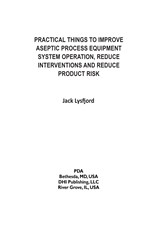Practical Things to Improve Aseptic Process Equipment System Operation, Reduce Interventions and Reduce Product Risk (single user digital version)
- Format
- PDF Single user
- Member Price
- $35.00
- Nonmember Price
- $45.00
- Government Price
- $25.00
Please sign in or become a member to purchase items from the PDA bookstore.
This chapter is taken from the book Practical Aseptic Processing: Fill and Finish, Volume 1
This document provides suggestions that will enable you to have systems that run well all the time and improve aseptic process equipment system operation, reduce interventions and reduce product risk. It provides the guidance necessary to implement systems that run well all the time by recommending methods that use barriers and isolators on machines thereby eliminating people intervening with process equipment. If stops are reduced to a minimum (zero would be ideal) there would be no interventions and, virtually, no product contamination.
Available to download. Prior to purchase please view the download instructions and Terms of Usage.
Format: Digital PDF (1 file - 109 MB)
Table of Contents
About the Authors
About the Authors
Jack Lysfjord, PhD is
Principal Consultant for Lysfjord Consulting LLC. For over 26 years, Lysfjord
has held a variety of management positions with Bosch Packaging Technology
(formerly TL Systems Corporation) that produced aseptic processing equipment for
producing injectable drugs. He is a member of the International Society for
Pharmaceutical Engineering (ISPE), Parenteral Drug Association (PDA), American
Association of Pharmaceutical Scientists (AAPS), the American Glove Box Society
(AGS), The Parenteral Society (UK), The Isolator Users Group (UK), R3 Nordic
(Nordic Clean Room Processing Society) and Barrier Users Group Symposium (BUGS)
of which he is Chairman. He is a frequent speaker and course leader on the
topics of aseptic processing, RABS (Restricted Access Barrier Systems) and
barrier isolator systems in the US, Europe and Asia and has been the author and
co-author for numerous technical papers and articles. Lysfjord holds a B.S. in
Mechanical/Industrial Engineering from the University of Minnesota and an MBA
from the University of St Thomas.

